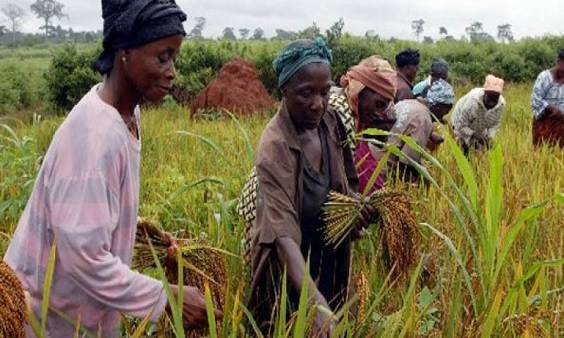The Ghana Rice Inter-Professional Body (GRIB) has issued a strong warning to the government over what it describes as a looming collapse of Ghana’s rice sector, citing massive unsold stock, cash flow challenges, and continued importation of cheap and smuggled rice that threaten the livelihoods of thousands of local farmers.
In a press release signed by its President, Nana Kwabena Adjei Ayeh, GRIB expressed deep concern about the “worsening crisis” in the local rice value chain and called for immediate, transparent, and coordinated intervention from the government.
GRIB, the officially recognized apex body representing stakeholders from seed production, farming, aggregation, milling, packaging, marketing, and distribution, noted that Ghana’s rice industry has made significant strides over the past decade—achieving a production milestone of 1.3 million metric tonnes in 2024 and a projected 1.5 million metric tonnes for 2025.
However, this progress, the group warns, is now in jeopardy.
“Over 500,000 metric tonnes of locally produced paddy rice remain unsold, locked up in warehouses and on farms across the country,” the statement said. “Farmers have been left without funds to operate, millers and transporters are struggling to pay workers, and the ongoing harvest is compounding the crisis.”
GRIB also raised alarm over the influx of expired, cheap, and smuggled foreign rice, which it says undermines local producers and poses a threat to national food security.
The group expressed dissatisfaction with the National Food Buffer Stock Company (NAFCO) over its handling of a GHS 100 million intervention fund announced in September 2025 to purchase surplus rice and other grains.
“Up to this point, there is no public information on where, how, or to whom that money was disbursed,” the statement said.
“No GRIB member has received a contract to buy or mill, no farmer organization in our network has been contacted, and no public accountability has been demonstrated.”
While welcoming the government’s announcement of an additional GHS 100 million to address the rice glut, GRIB insists that this time transparency, fairness, and proper stakeholder engagement must be the guiding principles.
To salvage the rice sector, GRIB has outlined seven urgent steps the government must take:
- Immediate publication of the list of companies, districts, and quantities purchased under the initial GHS 100 million.
- Clear timelines for the release and utilization of the new GHS 100 million allocation.
- Public disclosure of approved millers, buying companies, and aggregators, with specific district assignments.
- Direct engagement between NAFCO and GRIB to ensure contracts go to legitimate rice value chain actors—not intermediaries.
- Mandatory local rice procurement by all state-funded institutions, including Free SHS schools, prisons, hospitals, and security agencies.
- Temporary suspension of rice imports and stricter border enforcement to stop smuggling and rebranding of foreign rice.
- National promotion campaigns for Ghana rice, jointly led by GRIB, the Ministry of Food and Agriculture (MoFA), and the Ministry of Communication.
Beyond the immediate crisis, GRIB is calling for the establishment of a national grain purchasing and marketing policy to prevent similar disruptions in the future—not only for rice but also for other key food crops such as maize, soybeans, and cowpeas.
“Ghana has the capacity to become fully self-sufficient in rice within five years,” Nana Ayeh stated.
“What our farmers need is market access, fair pricing, and genuine institutional commitment. The time for talk is over—action is needed now.”
The statement reaffirms GRIB’s readiness to partner with government agencies to stabilize the sector, but warns that failure to act swiftly could erase years of progress and plunge thousands of farmers and agribusinesses into bankruptcy.
Click the link Puretvonline.com | WhatsApp Channel to join the WhatsApp channel
GOT A STORY?
Contact/WhatsApp: +233243201960 or manuelnkansah33@gmail.com

